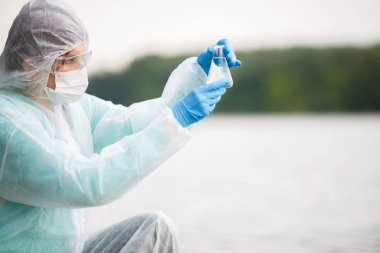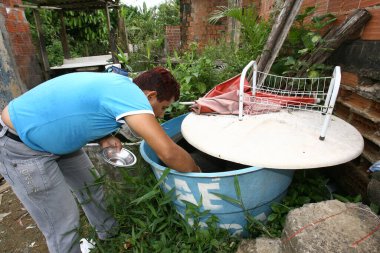- Home
- How to Dispose of Household Hazardous Waste
- How to Dispose of Contaminated Water
how to dispose of contaminated water-A Guide for Safe and Environmentally-Friendly Solutions
Dealing with contaminated water is a task that requires careful attention and knowledge. Whether it's from your home, a business, or an industrial site, understanding how to properly dispose of contaminated water is crucial for protecting both human health and the environment. Wastewater treatment is a vital process in this, ensuring that harmful substances are removed before water is released back into nature or reused.
Contaminated water poses a significant threat to our health and the planet. By learning the correct methods of disposal, you contribute to a safer, cleaner world. This guide aims to equip you with the necessary knowledge to handle contaminated water responsibly and efficiently, showcasing various disposal methods and the importance of adhering to regulations

Understanding the Risks of Contaminated Water
Contaminated water can harbour dangerous pathogens, heavy metals, and toxic chemicals, posing serious risks to human health and the environment. Without proper wastewater treatment, these contaminants can spread disease, harm wildlife, and pollute drinking water sources. Recognizing the dangers associated with contaminated water is the first step in mitigating its harmful effects.
1. Identifying Types of Contamination
The types of contamination in water can range from biological agents like bacteria and viruses to chemical pollutants such as pesticides and industrial waste. Understanding the specific contaminants in your water is essential for choosing the appropriate disposal method. Each type of contamination requires a different approach to ensure that the water is treated effectively and safely.
2. The Health Hazards Associated With Improper Disposal
Improper disposal of contaminated water can lead to serious health hazards. Without effective wastewater treatment, contaminated water can seep into groundwater, rivers, and lakes, becoming a vector for diseases. Communities relying on these water sources for drinking, bathing, and irrigation can face significant health risks, underscoring the importance of proper disposal methods.
Effective Disposal Options for Contaminated Water

Several effective disposal options exist for managing contaminated water, including wastewater treatment, the use of washwater systems, the handling of hazardous materials, and the incorporation of waste removal services. Each method, including sending it to a treatment facility, plays a crucial role in ensuring that contaminated water is processed safely and in compliance with environmental standards.
1. Dewatering: Separating Water from Solids
Dewatering is a process in wastewater treatment that involves separating solids from water. This method is particularly useful in construction sites and industrial settings where water might be mixed with soil, sand, or other solid materials. By removing the solids, the remaining water becomes easier and safer to treat and dispose of.
2. Sedimentation: Settling Solid Particles
Sedimentation is a method used to remove solid waste from water by allowing the particles to settle to the bottom of a tank or basin. This technique is effective for treating water with high levels of sediment or particulate matter. Once settled, the solids can be collected and disposed of separately, leaving cleaner water behind.
3. Composting: Organic Waste Treatment
Composting is an organic waste treatment process that can be applied to certain types of contaminated water, especially those with naturally occurring organic matter. By adhering to state and federal guidelines, this method transforms waste into useful compost, reducing the environmental impact and promoting sustainable waste management practices.
4. Incineration: High-Temperature Waste Destruction
For contaminated water containing hazardous chemicals, incineration offers a solution by destroying pollutants through high-temperature burning. This process must comply with state and federal regulations to ensure that emissions are controlled and do not pose a threat to the surrounding environment or public health.
5. Root-Zone Treatment: Natural Filtration Method
Root-zone treatment utilizes the natural filtration capabilities of plants to remove contaminants from water. This method involves passing the contaminated water through a sedimentation tank and then through areas planted with specific vegetation that can absorb and break down organic and inorganic pollutants, making it an eco-friendly option for water purification.
6. Solidification: Stabilizing Liquid Waste
Solidification is a technique used to stabilize liquid waste by turning it into a solid form, making it easier to handle and dispose of. This process is beneficial for contaminated water that cannot be treated through conventional means, as it minimizes the risk of leakage into the surrounding environment.
7. Direct Disposal: Regulations and Safe Practices
Direct disposal of contaminated water into designated sites or facilities requires strict adherence to regulations and safe practices. This method is typically reserved for water that has been treated and deemed safe for release, ensuring that it does not harm the environment or public health.
The Role of Waste Disposal Services

Waste disposal services play a critical role in managing contaminated water, offering expertise and resources to ensure that disposal is conducted safely and in compliance with environmental regulations. By leveraging their specialized knowledge, these services help protect the surrounding environment from the potential harms of improperly treated water.
VLS Environmental Solutions: A Case Study
VLS Environmental Solutions showcases innovative waste management practices, demonstrating the importance of specialized services in handling contaminated water efficiently and responsibly.
Innovative Approaches to Hazardous Waste Management
In the realm of hazardous waste management, adopting innovative approaches is key to improving safety and efficiency. From advanced treatment technologies to sustainable disposal methods, these innovations are crucial in addressing the challenges of managing contaminated water and protecting both human health and the environment.
Legal and Ethical Considerations in Waste Disposal
Navigating the maze of legal disposal requirements can seem daunting, but it's essential for protecting our environment and communities. You must understand these regulations to ensure that your methods of disposing of contaminated water do not harm others or the planet. Ethically, it's about doing what's right, even beyond what's legally mandated, considering the broader impact of disposal actions on future generations.
1. Disposal Guidance: Navigating Regulations
When dealing with rinse water, a specific type of contaminated water, it's crucial to follow local regulations that dictate safe disposal practices. These rules are in place to prevent harmful substances from entering our water systems. Ignoring them not only poses a risk to public health but can also lead to significant legal penalties. Always check with environmental agencies to ensure compliance.
2. The Importance of Ethical Disposal Methods
Choosing ethical disposal methods goes beyond following the law; it's about taking responsibility for the well-being of our environment. Ethical disposal ensures that we're not just avoiding penalties but actively contributing to a healthier planet. It involves considering the long-term effects of disposal choices and prioritizing sustainable practices that minimize harm to our ecosystems.
DIY Vs. Professional Disposal Methods
While DIY disposal methods may seem cost-effective and straightforward, they often fall short in safely handling hazardous waste. Professional disposal methods, on the other hand, offer the expertise and equipment necessary to manage contaminated water responsibly. Deciding between DIY and professional services depends on the nature and volume of the waste, as well as the potential risks involved.
1. When to Contact Professionals for Hazardous Waste Disposal
If you're dealing with hazardous waste, it's crucial to contact professionals who specialize in waste management and disposal methods. These experts have the training and tools necessary to handle dangerous substances safely, ensuring that your disposal practices meet all regulatory requirements and safeguard public health. When in doubt, opting for professional services is always the safer choice.
2. Safe Practices for Small-Scale Disposal
For small-scale disposal needs, there are safe practices you can follow to minimize risks. Always wear protective gear, segregate waste based on its type, and use designated containers for disposal. However, remember that some types of waste still require professional handling, so it's important to recognize when a job is beyond DIY capabilities and seek expert help.
A Cleaner Future: Concluding Thoughts on Water Contamination Disposal
As we look toward a cleaner future, the importance of responsibly managing contaminated water becomes clear. The array of disposal options available, from sewage treatment plants to innovative techniques like root-zone treatment, offers promising pathways to protecting our water supply and water table.
Moreover, sectors like oil and gas must prioritize safeguarding resources through methods such as landscape irrigation, where treated water can be reused beneficially. With a mindful approach to disposal and a commitment to exploring sustainable practices, a future with safer, cleaner water is within our reach.